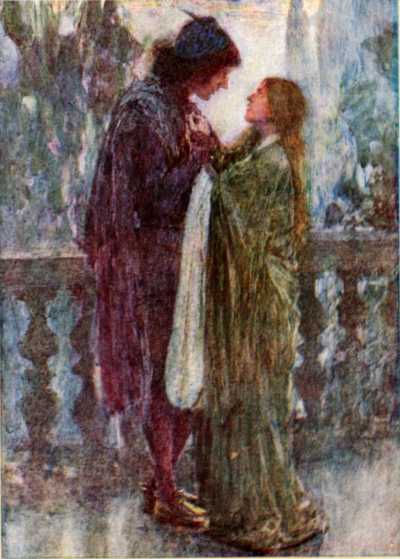
SHAKESPEARE
DAYS WITH POETS

"Some ardent love-scene in the rich dim gardensof Verona."
Juliet. This bud of love, by summer's ripening heat,
May prove a beauteous flower when next we meet.
(Romeo and Juliet).

ROMEO AND JULIET.
Painting by W. Hatherill, R.I.

A DAY WITH WILLIAM SHAKESPEARE
HODDER & STOUGHTON
In the same Series.
Tennyson.
Browning.
E. B. Browning.
Burns.
Byron.
Longfellow.
Whittier.
Rossetti.
Shelley.
Scott.
Coleridge.
Morris.
Wordsworth.
Keats.
Milton.
A DAY WITH WILLIAM SHAKESPEARE.

IT was early on a bright Junemorning of the year 1599.The household of ChristopherMountjoy, the wig-maker, atthe corner of Silver Street inCripplegate, was already upand astir. Mountjoy, his wifeand daughter, and his apprentice, StephenBellott, were each refreshing themselves witha hasty mouthful—one could not term itbreakfast—before beginning their day's work.For town wig-makers were busy folk, then asnow. Every fashionable dame wore "transformations,"and some noble ladies, like thelate Queen of Scots and—breathe it low—thegreat Elizabeth herself, changed the colourof their tresses every day.
Breakfast, in 1599, was a rite "morehonoured in the breach than in theobservance." Most people, having suppedwith exceeding heartiness the previous night,ignored breakfast altogether: especially asdinner would occur some time between 10 and12 a.m. Those who could not go long withoutfood had no idea of a regular sit-down mealduring that precious morning hour which "hasa piece of gold in its mouth." They contentedthemselves with beaten-up eggs in muscadelwine, as now the Mountjoy family; who, beingof French origin, boggled somewhat at the onlyalternative—a very English one—small ale andbread-and-butter.
To these good folk, standing up andswallowing their morning draught, entered theirwell-to-do lodger, Mr. William Shakespeare,up betimes like them—for he was a very busyperson,—and shared their jug of eggs andmuscadel. Mr. Shakespeare was thirty-fiveyears of age, "a handsome, well-shap't man,"in the words of his friend Aubrey,—his eyeslight hazel, his hair and beard auburn. He stillretained, in some degree, the complexion whichaccompanies auburn hair, and this imparted atinge of delicacy to his sensitive and mobileface. He was already slightly inclined toembonpoint: for in the seventeenth centurypeople aged soon, and thirty-five was muchmore like forty-five nowadays.
In all company, with